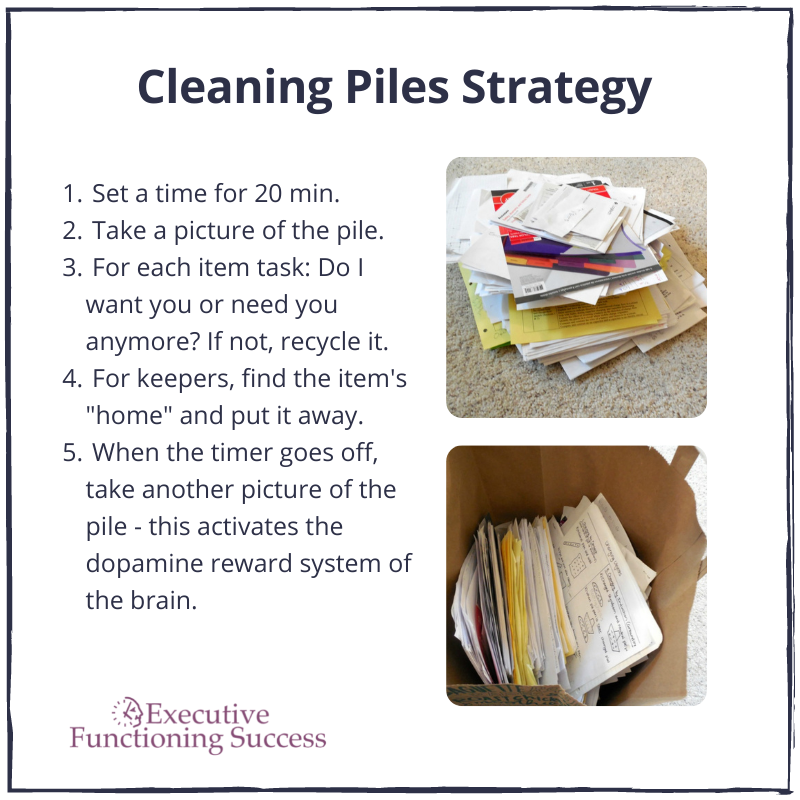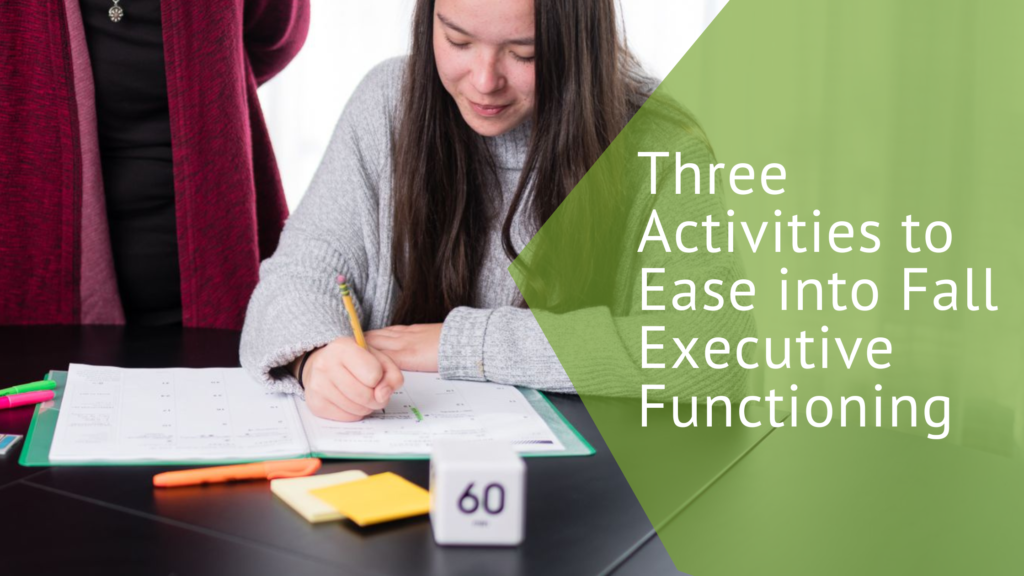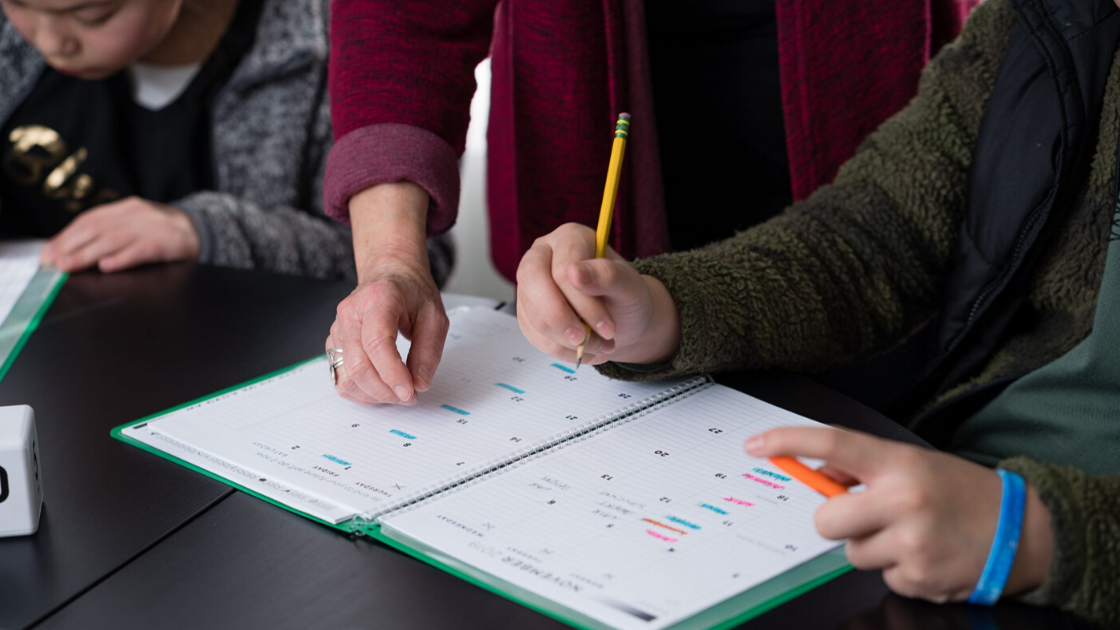Bringing up the “end of summer” topic can feel pretty unwelcome. Who wants to leave behind days of summer adventures and chilling out? Not me! But we all know that the transition is sneaking up.
The best way to set up a successful transition to fall, with all its school and work demands, is to gently activate those executive functions of future thinking and organization. This blog features exercises to try that will help ease your family into using their executive functions again.
In the spirit of summer, I suggest approaching these tips from a playful, fun-oriented mindset. Celebrate progress while keeping expectations small and achievable. All family members can participate with personal goals for each small chunk of time.
Did you notice that I said ALL family members? No one wants to do any of the following things, including the adults in the family who are forever passing along expectations for their children’s behavior while *ahem* not always modeling the same behavior with their own tasks.
So let’s address the resistance. Children and adolescents are really quick to spot hypocrisy. That’s where teamwork concept comes into play. When you are setting up times to accomplish these tasks, make it clear that the adults in the household will also be participating during the same time period with their own goals and tasks. This sets up a win-win situation where everyone joins in.
1. Organize Personal Spaces (Cleaning Piles Strategy)
 As I teach in Seeing My Time, “A mess outside your body creates a mess inside your mind.” August is a great time to declutter and organize rooms and closets. I love to use the Cleaning Piles Strategy for motivation to tidy the piles that build up around the home.
As I teach in Seeing My Time, “A mess outside your body creates a mess inside your mind.” August is a great time to declutter and organize rooms and closets. I love to use the Cleaning Piles Strategy for motivation to tidy the piles that build up around the home.
Tools needed: a timer and a couple of garbage bags
- Set a timer for 15-20 minutes to tackle just a part of the room or closet.
- Take a picture of the pile or space you are going to organize.
- Evaluate each item. Do you still need it or want it? Depending on the item, trash it or recycle it via a second-hand store.
- If you are keeping it, identify the “home” for this object. Where does it “live” when you aren’t using it? Put it in its home.
- When the timer goes off, take another picture.
- Gather together with the rest of the family and share the progress pictures! Give each other high-fives, fist-bumps or do a “happy dance.” Celebration is really important as it activates the dopamine reward system in the brain, making it easier to approach the next undesirable task.
- Together, set a date and time for your next tidying and organizing time. By doing smaller chunks of time repeatedly, you will be all organized by September.
2. See the Future
On your family calendar, in digital calendars and in personal planners, enter the following dates so events don’t take you by surprise.
Tools needed: Paper family calendar, adult planners, and student planners. (If you don’t have one you can order our planners for the whole family.)
- Have your student go online to find their school’s academic year calendar.
- Next, both the student and the adults should enter/write down the following dates on their planner/calendar.
- First day of school
- For college students: the last date to drop a class without penalty
- School holidays
- Mid-terms
- Family nights
- Winter/Spring breaks
- End of school year
- Add personal and family events too, things like:
- Sports tournaments, performances, competitions, birthdays
- Religious holidays
- Family vacation dates – even if you don’t yet know where you are going!
- Medical/dental checkups
If you find this activity useful, check out my post on How to Hold Family Meetings to Support Executive Functions and Planning.
3. Warm Up Your Brain
After a summer of movie nights and video games, it is time to reactivate those neurons in your brain to set up easier learning in the fall. There are no specific supplies needed to carry out these tips!
- For younger students, it’s time to review basic math facts. Make it fun! There are lots of games available. Play the game WITH your student. However, don’t use timed tests, which set up stress in the brain and inhibit performance.
- If you have older students, do they have assigned summer reading? If so, set up a reading schedule for everyone in the family to either read that book at the same time or read their own books. Discuss the books at dinner. Each of you can find one new vocabulary word to share with the family. Make a chapter graph and fill in completed chapters so you can see progress. Celebrate that progress!
- Upgrade keyboarding skills: This one is for the whole family. Get a keyboarding program and have everyone commit to 5-10 minutes, 5 times a week and share progress about improvement is speed and accuracy. Set goals and personal rewards.
- Preview upcoming course topics: will your student be taking advanced math or science courses? Do you feel incompetent to help with questions? Through my public library, via Kanopy.com., I can access free no-credit high school courses developed by the Great Courses. Their instructors are great. I recommend watching the videos together to build a bit of prior knowledge in both of your brains. It will be easier to make connections and learn in class. Check with your librarian for access or you can buy courses directly from The Great Courses website. (Tip: There are tons of great learning resources in Kanopy for adults. I love their history, art, music, science and baking courses. I listen to them while I am cooking!)
Consider which of these tips you would like to use. Have a discussion with your family and schedule small chunks of time to work on these goals. It will truly make for a smoother transition to the demands of autumn and set up executive functioning success.
Little by little…
Marydee


